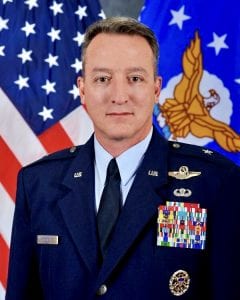
Retired Brig. Gen. Patrick Mordente has dedicated his life to serving the United States, first through the military and now at the George W. Bush Presidential Library and Museum. Mordente was appointed to be the director of the Bush Library & Museum in February. He is also a member of the Tower Center Board of Directors, a Tower Center Senior Fellow, and a professor for the Tower Scholars Program. The Tower Center sat down with Mordente to discuss his transition from commanding an air force base to directing the 13th presidential library.
Tower Center: What brought you to the Bush Library and Museum?
Mordente: I was retiring from the Air Force in two months, and an honorary commander learned that the George W. Bush Library & Museum was losing their director and that they would like a senior military officer to fill the position. Eventually I ended up talking to the CEO Ken Hersh about if I was interested in being the director. I said obviously I have the utmost respect for President Bush who was my commander in chief, a great commander in chief, and I would love to be able to serve again.
I said I’m not an archivist, I’m not a librarian, and they said don’t worry. As a director it’s more about the public outreach, the engagement, developing the cooperation between the foundation and SMU. I was interested so I put in the application with the federal government, and five interviews later I was selected.
You retired officially from the Air Force in October and began your position as director in February. Were you planning on rejoining the workforce so quickly?

I’m too young to retire; I’d go crazy. I was looking at what to do next. Of course I thoroughly enjoyed my military career, but it’s that next chapter in life; what are you going to do next? At the museum and library I am able to continue serving. We teach people about their government, we engage with SMU’s campus and with local school districts, we engage with the American people. They have the opportunity to come in and say, “Here’s the history behind the Bush administration and all the challenges they had to deal with and how they dealt with them.” I mean, that’s rewarding.
Was there something about President George W. Bush and hislegacy that made the opportunity to direct his library and museum stand out?
His respect for the military. His respect for the veterans who have served. I’ve always said that when I raised my right hand and joined the military I knew that going into combat, into harms way, was part of the bargain. I served in Afghanistan and I served in Iraq. I respected him as my commander in chief, and I still respect him, because he always had my back. He was a president that cared about his military; he was a president that cared about his veterans. He respected sacrifices we made. That’s what stood out to me about President Bush: his loyalty to the veterans.
Aside from your full-time job at the library and museum you have also accepted a position teaching a course for the Tower Scholars Program. Why?
I have to go back to my air force days to explain why. As I became older in the air force it became incumbent upon me to teach, and shape, and develop the next airmen. It’s not about me as an individual, it’s about the organization, the future of the air force. I became even more nostalgic the older I got in the air force — in essence I was building my replacement.
Take that one step further into the civilian world. I was given an opportunity to teach and help shape and instruct a young leader. I look at the Tower Scholars as future leaders within our country, whether it’s in the private sector or in our government; to someway be able to help bring them along and develop them as leaders, to me that’s more rewarding than a paycheck. I remember day one, walking into class with these 12 students, and thinking they’re extremely sharp. I was extremely impressed by the caliber of students in my class. I think the country is in good hands.
Given your experience in the air force mentioned above, did teaching come naturally to you?
I’m still working on my approach. I’ve been in an academic training environment. This is more of an academic education environment, and there’s a difference between training and education. The advantage I have is that I was a practitioner.
How are you using your experience as Director of Mobility during the Ebola crisis to teach Tower Scholars about the reality of building and implementing policy?
The relationship between the central government library side, SMU, and the Bush foundation — there’s a great synergy that occurs when we can leverage all three. I can use my crisis management experience with the Ebola crisis as a backdrop and show an international policy issue that involves agencies within the executive branch. I can show how that works not only within the executive branch, but how it played into the governments of Liberia, Europe, and the United Nations.
Following the discussion of the Ebola crisis the second scenario is going to be the No Child Left Behind Act, signed into law by President Bush in 2002. We are going to bring over people from the Bush Foundation to talk about what’s truly a U.S. national policy so that the students can have a flavor of both international and national policy.